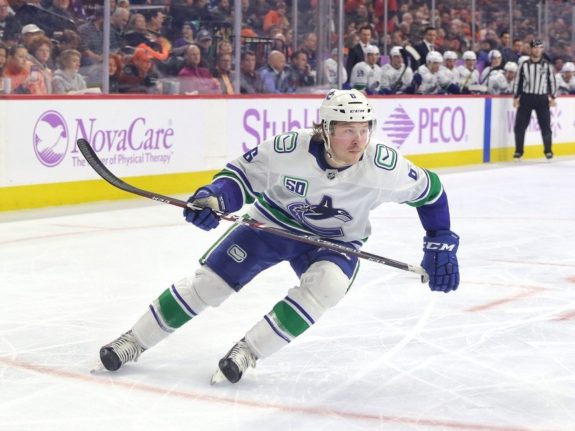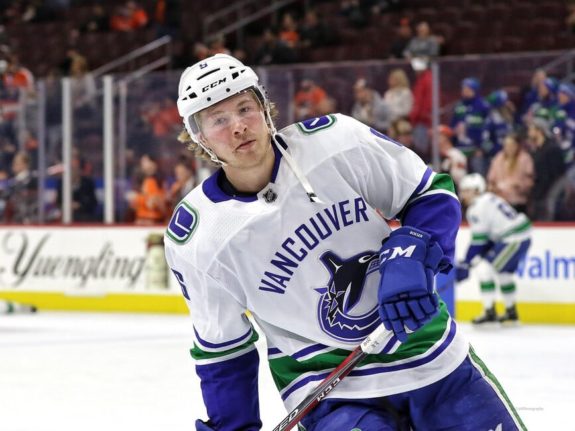Part of the new CBA extension that became finalized last week entailed keeping a flat salary cap, at $81.5 million, for the 2020-21 season. The New Jersey Devils will benefit from that, as they’ll have a projected $26 million in cap space, while a team like the Vancouver Canucks is going to be in a cap crunch come the offseason.
In recent days, it’s come out the Canucks have discussed the possibility of moving right-winger Brock Boeser. You might ask yourself why that’s even under consideration. But reports indicate they’ve come to value Tyler Toffoli more than Boeser (From ‘Phase 3 Canucks training camp: The traveling party and the Brock Boeser thing,’ The Athletic – 6/13/2020).
Now, this doesn’t mean Boeser is on his way out. He’s likely not even on the trading block. But if things come to a head this offseason, and the Canucks need to open up cap space to re-sign Toffoli, the Devils should be in hard pursuit of Boeser to speed up their rebuild.
Boeser an Offensive Weapon
First, a little background on Boeser. He was a first-round pick of the Canucks at the 2015 Draft and spent two seasons at the University of North Dakota (NCAA), where he became one of the top college scorers. He joined the Canucks at the end of the 2016-17 season and became a regular in 2017-18, finishing with 55 points in 62 games that season.
Related: Devils Drafting Lucas Raymond Would Be Dream Scenario
Since then, Boeser has proven he’s one of the Canucks’ top scorers. He’s averaged 67 points per 82 games across his first three seasons and was on pace to finish with 55 points in 70 games when the league hit pause in March due to COVID-19. He’s averaged 2.04 points per 60 minutes at five-on-five over the last three seasons, tying him with Nico Hischier and placing him ahead of Matthew Tkachuk, Blake Wheeler, and Andre Burakovksy to name a few. He has a 12.9% career shooting percentage, so the shooting talent is there too.

As you may have guessed, Boeser’s strengths lie on offense. He has a goals above replacement (GAR) of 25.8 when it comes to even-strength offense. That places him first on the Canucks and ahead of Elias Pettersson, though Pettersson didn’t make his NHL debut until 2018-19. Boeser’s overall GAR of 34 is 42nd-best among NHL forwards since 2017-18, placing him ahead of Matthew Tkachuk, Kyle Palmieri, and just behind Jason Zucker.
GAR isn’t the end all be all for player evaluation. But the fact Boeser compares well to other high-end scoring wingers shows he can impact the game offensively. What’s most encouraging is it comes at even-strength and that he doesn’t rely on the power play to impact the game. And that usually bodes well for future scoring success.
Boeser Won’t Come Cheap
The Devils have some solid pieces to build around for new coach Lindy Ruff. He’ll inherit a pair of former first overall picks in Hischier and Jack Hughes. He’ll also have a few capable scoring wingers in Palmieri, Jesper Bratt, and Nikita Gusev. Ruff’s stated he plans on playing a fast-paced, possession-heavy system with the Devils. So already having those players on the roster will help him implement such a style.
But even though the Devils’ crop of forwards should fare well under Ruff, his defenses as the Dallas Stars’ head coach were quite porous. That isn’t likely to change with the Devils, though that’s not to say they’ll have the worst defense in the league. But they will need to have enough firepower to outscore their opponents on some nights.
That’s where Boeser comes into the fold. He’s produced at a high clip in his first three NHL seasons and would be stepping right into a scoring role with the Devils. He’s only 23 years old, so he’s in the same general age range as Hischier and Hughes. Plus, he’ll be a restricted free agent (RFA) when his contract expires after the 2021-22 season, meaning he’ll be under team control for a while.

The thing is players like Boeser don’t get traded often, nor are they cheap when they do. If the Canucks need to shed salary for Toffoli, it’ll likely take multiple pieces to acquire Boeser. Fortunately, the Devils own some extra draft picks they can use as trade bait. And one of them happens to be the Canucks’ 2020 first, which they acquired in trading Blake Coleman to the Tampa Bay Lightning.
As for prospects, the Devils have a solid farm system, even though it lacks star power. Ty Smith is probably off the table, but Jesper Boqvist may be a fit, as he could crack the Canucks’ NHL lineup as early as 2020-21. He fits into their financial plans, because he’s in the first year of his entry-level deal, and he has top-six upside.
Related: Ruff’s Stint With the Stars Gives Devils Glimpse of Future
I’ve seen a few trade proposals on social media suggesting the Devils include NHL talent if they’re to acquire Boeser. Because of the Canucks’ financial situation, that seems unlikely. It also doesn’t make sense for the Devils to trade away NHL talent since it’d probably create another problem they’d have to address. The best guess as of now is it’d be a futures-heavy package that lands them Boeser. It’s possible the Canucks’ 2020 first-rounder, a 2021 second-rounder, and a top prospect gets them close to completing a deal. And it may still take a bit more than that.
If Not Boeser, It’ll Be Someone Else
If the Devils want to speed up their rebuild, acquiring someone like Boeser will do just that. They have enough assets, whether it’s draft picks or prospects, to make it happen. He’s not going to fix all their issues, but he will be a significant boost to their offense. A top line with Gusev, Hischier, and Boeser could be pretty lethal. A second line with Bratt, Hughes, and Boeser wouldn’t be too shabby, either.
If Boeser ends up staying put, which is usually how these situations play out, the Devils will be able to weaponize their cap space elsewhere. And they’ll have to for a couple of reasons, one being for Ruff’s offensive system. But they also need to keep developing Hischier and Hughes, and surrounding them with the right players will go a long way. If they do that, then they could be a competitive team sooner than later.
* * *
Advanced stats from Natural Stat Trick, Evolving Hockey